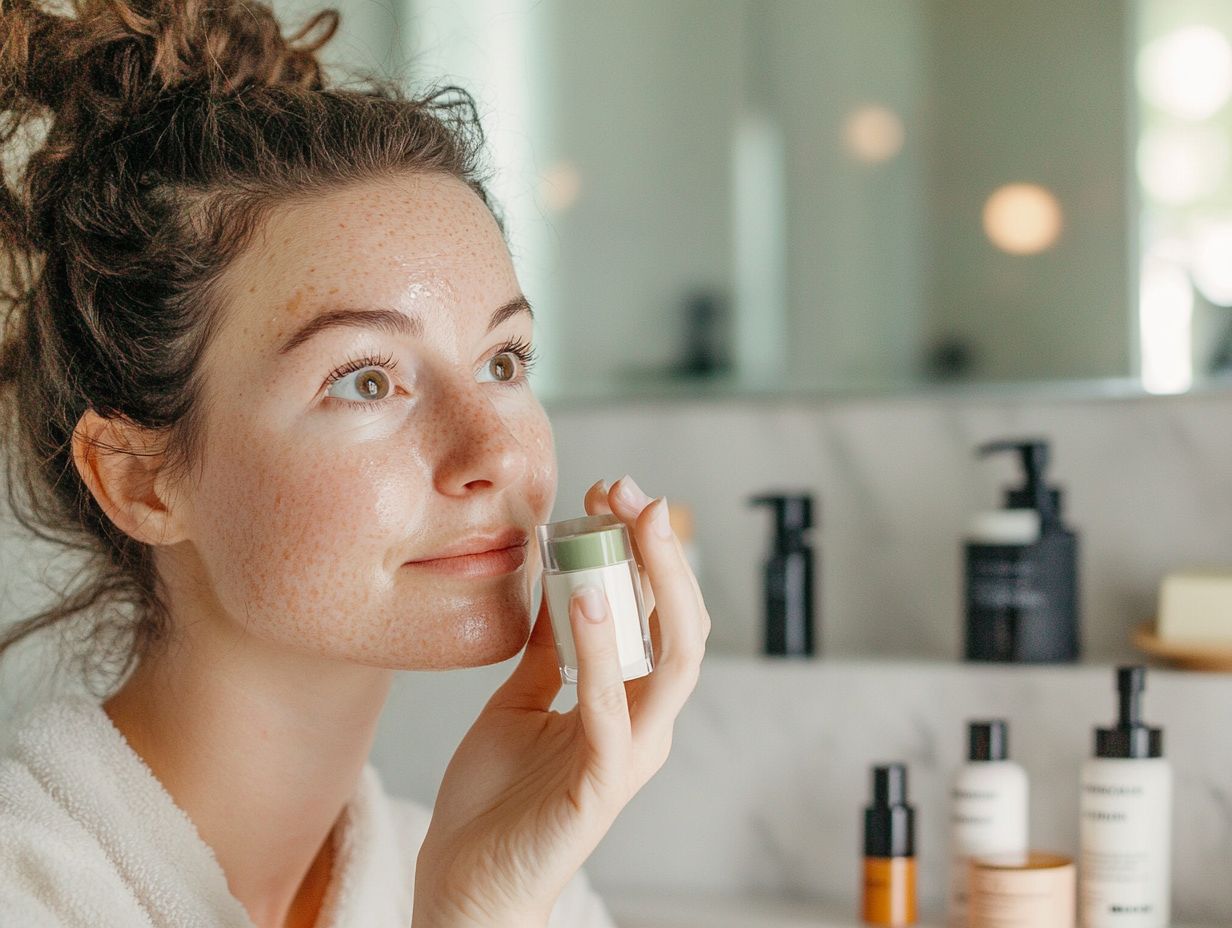Rosacea can be a frustrating and often misunderstood skin condition, affecting millions worldwide.
This article explores its symptoms and causes to help you identify and understand your skin better.
It also shares effective skincare practices and product recommendations tailored for rosacea, alongside makeup tips that enhance your natural beauty while minimizing redness.
Lifestyle changes that can help manage flare-ups, as well as alternative treatments worth considering, will also be discussed.
Discover how to navigate rosacea with confidence!
Key Takeaways:

Understanding Rosacea
Rosacea is a chronic dermatological condition that primarily affects the facial area, presenting symptoms such as erythema, visible blood vessels, and in some cases, acneiform lesions. This condition predominantly impacts individuals with sensitive skin.
Dermatologists advocate for customized skincare regimens to effectively manage flare-ups and enhance skin comfort. Proper management of rosacea is essential for preserving skin health and preventing exacerbation of symptoms, especially for those with heightened skin sensitivity.
Symptoms and Causes
Symptoms of rosacea can vary significantly among individuals; however, common signs include facial redness, visible blood vessels, and a tendency for flare-ups that are often triggered by various factors.
These flare-ups may lead to discomfort, resulting in individuals feeling self-conscious about their appearance. Often, those affected may experience additional symptoms such as dryness, itching, or a burning sensation, which can further compromise skin comfort.
While the exact cause of rosacea remains uncertain, genetic predisposition is a significant factor, along with environmental triggers such as sun exposure, temperature fluctuations, and certain skincare products.
Furthermore, lifestyle factors, including diet and stress levels, can contribute to increased skin irritation, ultimately impacting the overall quality of life for individuals with sensitive skin. Understanding these elements is essential for effective management of the condition.
Skincare for Rosacea

A well-structured skincare routine is critical for individuals with rosacea, emphasizing the importance of moisturizing and gentle cleansing to improve hydration and minimize skin irritation.
Best Practices and Products
Selecting appropriate skincare products is crucial for the effective management of rosacea. It is essential to prioritize alcohol-free, fragrance-free, and non-irritating formulations to reduce skin irritation.
This careful selection is vital, as inappropriate ingredients can exacerbate redness and inflammation. For individuals managing rosacea, gentle cleansers, such as those containing colloidal oatmeal or aloe vera, can cleanse effectively without stripping the skin of its natural moisture. Moisturizers formulated with ceramides and hyaluronic acid are highly recommended, as they provide hydration and support the skin barrier.
Additionally, treatments containing azelaic acid or metronidazole can be advantageous, as they target symptoms while being considerate of the skin’s unique requirements. When applying these products, it is important to use a gentle touch; employing soft, upward strokes can help maintain the integrity of the skin barrier and promote overall skin health.
Makeup Tips for Rosacea
For individuals with rosacea, it is essential to choose appropriate makeup products to achieve effective redness coverage while maintaining skin health and comfort.
Choosing the Right Products

Selecting the appropriate makeup products for individuals with rosacea necessitates the identification of formulations specifically designed for sensitive skin, ensuring that they are non-irritating and hypoallergenic.
This process typically involves seeking products that demonstrate ingredient transparency, thus enabling consumers to comprehend the components they are applying to their skin. It is imperative to prioritize formulations that are free from harsh chemicals, fragrances, and dyes, as these substances can exacerbate redness and irritation.
Foundations and concealers that are non-irritating and enriched with calming agents such as aloe vera or chamomile can provide effective coverage without causing discomfort.
Conducting patch tests on a small area of skin prior to full application can help assess potential reactions, thereby safeguarding sensitive skin. Ultimately, a thorough understanding of these factors is essential for making informed decisions that enhance beauty while prioritizing skin health.
Application Techniques
Proper makeup application techniques are essential for individuals with rosacea, as a gentle approach can significantly enhance skin comfort and minimize irritation.
Achieving a flawless appearance begins with selecting the appropriate tools; using soft brushes specifically designed for sensitive skin can yield substantial benefits. These specialized brushes not only facilitate even makeup distribution but also provide a soothing experience, which is particularly important for those experiencing facial redness.
When layering products, it is advisable to apply them gradually, starting with a lightweight foundation that offers a natural finish, followed by targeted concealers. This method helps prevent the heavy sensation that can exacerbate discomfort, ensuring that each layer blends seamlessly while preserving the skin’s breathable quality.
Lifestyle Changes for Managing Rosacea
Implementing lifestyle changes can greatly enhance the management of rosacea, particularly through effective stress management techniques and dietary modifications designed for sensitive skin.
Diet and Stress Management

A balanced diet and effective stress management are essential components of a holistic approach to managing rosacea and enhancing overall skin health.
Incorporating anti-inflammatory foods, such as fatty fish, leafy greens, and nuts, can significantly alleviate flare-ups while promoting a clearer complexion. Additionally, reducing the intake of spicy foods and alcohol may help prevent potential triggers associated with rosacea.
In conjunction with these dietary choices, managing stress through techniques such as mindfulness meditation, yoga, or regular physical exercise can further improve skin conditions. Engaging in creative activities like painting or gardening can also offer therapeutic benefits, enabling individuals to channel their energy in a positive manner, which ultimately contributes to improved skin health.
Alternative Treatments for Rosacea
Exploring alternative treatments for rosacea offers individuals supplementary options beyond traditional dermatological therapies. This approach includes the incorporation of natural remedies and therapies specifically designed for sensitive skin.
Natural Remedies and Therapies
Natural remedies and therapies can be advantageous for individuals experiencing rosacea, particularly those formulations that include soothing ingredients with anti-inflammatory properties.
For example, the application of topical aloe vera gel can provide immediate relief due to its hydrating and calming effects. Similarly, chamomile tea, recognized for its anti-inflammatory and antioxidant benefits, can be steeped and utilized as a compress to help diminish redness and irritation.
Incorporating green tea extracts into skincare regimens offers further protection against free radicals and supports skin healing, thereby enhancing overall skin health.
Such natural therapies not only alleviate discomfort but also foster a balanced complexion, enabling individuals to feel more confident in their skin.


